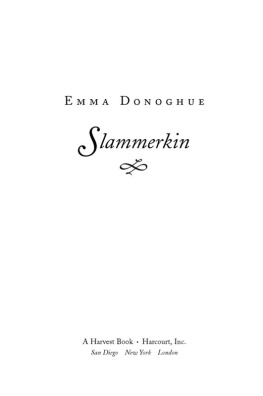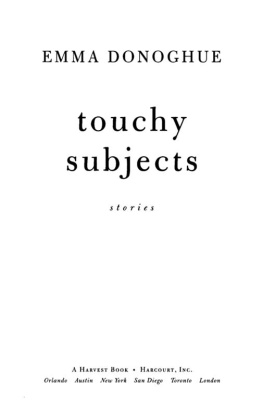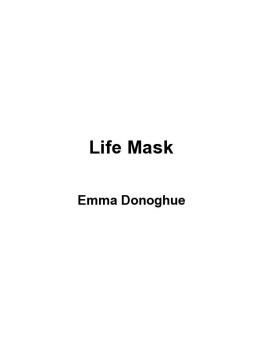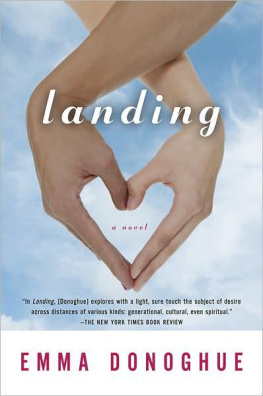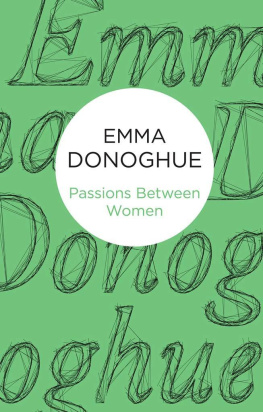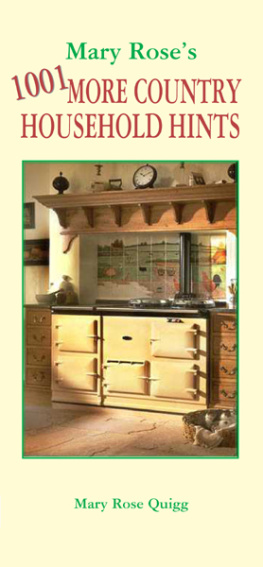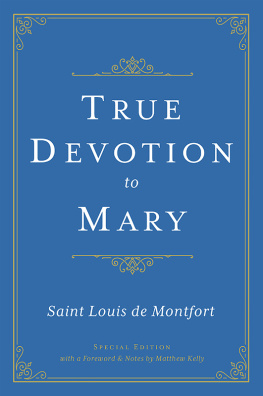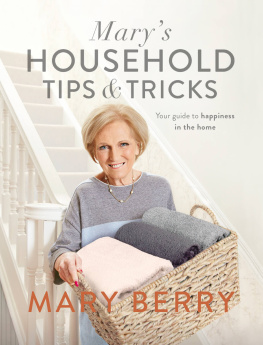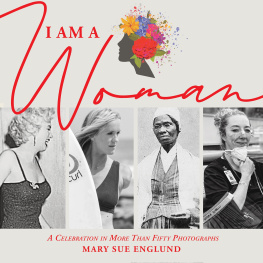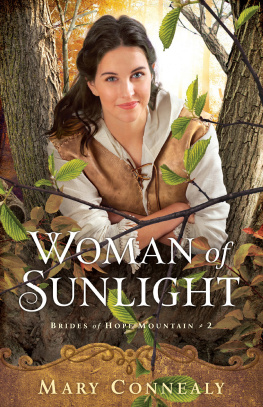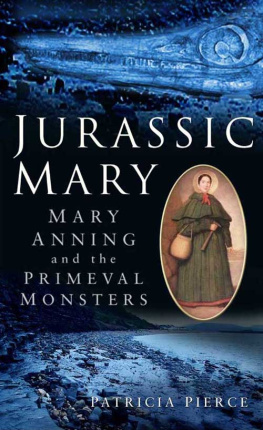A Harvest Book Harcourt, Inc.
San Diego New York London
Copyright Emma Donoghue 2000
All rights reserved. No part of this publication may be reproduced
or transmitted in any form or by any means, electronic or mechanical,
including photocopy, recording, or any information storage and retrieval
system, without permission in writing from the publisher.
Requests for permission to make copies of any part of the work should be
mailed to the following address: Permissions Department, Harcourt, Inc.,
6277 Sea Harbor Drive, Orlando, Florida 328876777.
www.HarcourtBooks.com
First published by Virago Press
Library of Congress Cataloging-in-Publication Data
Donoghue, Emma, 1969
Slammerkin/Emma Donoghue.
p. cm.
ISBN 0-15-100672-5
ISBN 0-15-600747-9 (pbk.)
1. Saunders, Mary, d. 1764Fiction. 2. Great BritainHistoryGeorge III,
17601820Fiction. 3. London (England)History18th centuryFiction.
4. WomenEnglandLondonFiction. 5. Monmouth (Wales)Fiction.
6. Women murderersFiction. 7. MurderFiction. I. Title.
PR6054.O547 S58 2001 00-049867
Text set in ACaslon
Designed by Cathy Riggs
Printed in the United States of America
First Harvest edition 2002
A C E G I K J H F D B
This book is for my agent
and tireless ally, Caroline Davidson.
Contents
Prologue
PART ONE London
1 Ribbon Red
2 Magdalen
3 Liberty
PART TWO Monmouth
4 The Whole Duty of Woman
5 Thaw
6 Bloom Fall
7 Punishment
8 As the Crow Flies
Note
Naked came I out of my mother's womb,
and naked shall I return thither.
T HE B OOK OF J OB, 1:21
Slammerkin, noun, eighteenth century, of unknown
origin. 1. A loose gown. 2. A loose woman.
Prologue
T HERE ONCE was a cobbler called Saunders who died for eleven days. At least, that was how his daughter remembered it.
In the year 1752 it was announced that the second of September would be followed by the fourteenth. The matter was merely one of wording, of course; time in its substance was not to undergo any change. Since this calendrical reform would bring the kingdom of Great Britain in line with its neighbours at last, what price a brief inconvenience, a touch of confusion? London newspapers printed witty verses about the 'Annihilation of Time,' but no one doubted the Government's weighty reasons. Nor did anyone think to explain them to persons of no importance, such as Cob Saunders.
He knew this much: injustice had been done. There were eleven days of chiselling shoe leather he'd never be paid for, eleven dinners snatched away before they reached his lips, eleven nights when he was going to be cheated out of the sweet relief of dropping down on his straw mattress.
On September the fourteenthNew Style, as they called itCob Saunders woke up with a hammering head and knew that eleven days of his life had been lost. Stolen, rather; cut out of his allotted span the way you might nick a wormhole out of an apple. He had no notion how those days had been done away with, or how he might fetch them back; his head was fit to split when he tried to figure it out. He was a man eleven days nearer to his death and there was nothing he could do.
But perhaps there was. When the Calendar Riots beganthough Cob had no part in the starting of themhe joined in with all the breath he had, tossing his rage onto the general bonfire. The cry went up: Give us back our eleven days.
The Government was merciful; Cob Saunders wasn't executed. He died of gaol fever.
Christmas came eleven days early, that year. The clamour of church bells pulled the air as taut as catgut, and the cobbler's five-year-old daughter Mary knelt below the window, watching for snow that never fell.
Eleven years later Mary Saunders was back on her knees, herself in gaol.
Like father, like daughter.
The night room in Monmouth Gaol was twenty-two feet long and fifteen feet wide. She'd measured it by pacing, her first night. Four walls and no windows: here the men and women awaiting trial at the Spring Sessions lived like rats. Some were chained up after sunset, but not necessarily the murderers; there was no rhyme or reason to it that Mary could see. Anything, she learned, could happen in the darkness. Rapes, and only a hiss for breath; blows, and no sound but the slap of meat. There was no straw provided, so shit piled high in the corners; the air was as thick as earth. One morning an old Welshman was found face down, unmoving. But nothing could shock Mary Saunders any more; she wouldn't let anything touch her now.
It had been worse back in September, when mosquitoes sang in the night heat and the guards didn't bring any water. Once before dawn it had rained so hard that water leaked through the cracked ceiling, and the prisoners laughed like hoarse lunatics and licked the walls.
Now it was Christmastide, and in the gaol's day room Mary Saunders sat on her feet like a carving, hour after hour. If she didn't move, she wouldn't feel. Her palms rested on the rough brown dress the gaolers had given her three months before; it felt like sacking, stiff with dust. Her eyes latched onto the barred square of window, followed the crows wheeling across the white frosty sky towards the Welsh border; her ears took account of their mockery.
The other prisoners had learned to treat the London girl as if she weren't there. Their filthy songs were inaudible to her; their gossip was a foreign language. Their couplings meant no more to her than the scratch of mice. If thrown dice happened to clatter against her knees, she didn't flinch. When a boy stole the blue-edged bread out of her hand, Mary Saunders only contracted her fingers and shut her eyes. She was going to die in gaol, just like her father.
Until the morning she felt a light tug in her chest, as if her heart were starting to unravel. Gin clouded the air. She opened her eyes to see a purse-snatch with only one sleeve stooped over her, delicately pulling a faded red ribbon out of Mary's stays.
'That's mine,' said Mary, her voice hoarse with disuse. With one hand she seized the ribbon, and with the other she took hold of the old woman by the soft part of the throat. She tightened her grip on the grey jowlish flesh while the thief choked and wrenched herself away.
Mary let her go, and wiped her hand on her skirt. Then she wound the ribbon round her thumb till it made a hard rusty-coloured ring, and tucked it back down her stays where it belonged.
PART ONE
London
CHAPTER ONE
Ribbon Red
T HE RIBBON had been bright scarlet when Mary Saunders first laid eyes on it, back in London. 1760: she was thirteen years old. The fat strip of satin was the exact colour of the poppies that grew in Lamb's Conduit Fields at the back of Holborn, where the archers practised. It was threaded into the silver hair of a girl Mary used to look out for at the Seven Dials.
Mary's motherknown as Mrs. Susan Digot ever since she'd remarried, a coalman this timehad told her daughter often enough not to pass through the Seven Dials on her way back from Charity School. A pond for the worst scum in London, she called the Dials. But the warnings drew the girl like a hot fire on a winter's night.
Besides, she was never in a hurry to get home. If it was still light when Mary reached the family's two-room cellar on Charing Cross Road, she knew what she'd see through the low scuffed window: her mother shipwrecked in a sea of cheap linen, scaly fingers clinging to the needle, hemming and cross-stitching innumerable quilted squares while the new baby wailed in his basket. There was never anywhere to sit or stand that wasn't in the way or in the light. It would be Mary's job to untie the baby's foul swaddlings, and not say a word of complaint because, after all, he was a boy, the family's most precious thing. William Digotthe Digot man, as she mentally called her stepfatherwouldn't get home from work for hours yet. It would be up to Mary to stand in the pump queue on Long Acre till nightfall for two buckets of water so he could wash his face white before he slept.
Next page
